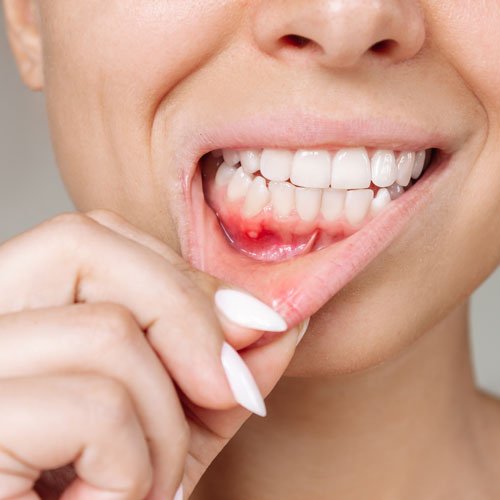Mouth Ulcers
What are Mouth Ulcers?
Mouth ulcers are small, painful sores that form in the oral cavity, appearing on areas such as the gums, tongue, inner cheeks, lips, or the roof of the mouth. These ulcers often cause discomfort when eating, drinking, or speaking. Typically red, yellow, or white, they are generally harmless and tend to heal on their own within a week or two, though they can be quite bothersome for many.
While the exact cause of mouth ulcers is often unclear, they may be triggered by factors such as minor injuries, allergies, stress, nutritional deficiencies, or underlying health conditions. This page will cover the symptoms, potential causes, and treatment options available to help manage mouth ulcers effectively.


Enhanced confidence

Excellent Dental Care
Types of Mouth Ulcers
Canker Sores:
These are the most common type of mouth ulcers, characterized by white or yellow sores with red borders. Though the exact cause is unclear, they can be triggered by factors such as minor injuries, acidic foods, and stress.
Oral Lichen Planus:
This condition results in itchy rashes and white, lace-like sores inside the mouth. It is an immune system response that primarily affects women and individuals assigned female at birth who are over 50 years old.
Leukoplakia:
Leukoplakia is characterized by white or gray patches inside the mouth, resulting from excessive cell growth. While it is often linked to chronic irritation from tobacco use, it can also occur without an identifiable cause. These lesions are typically non-cancerous.
Erythroplakia:
Erythroplakia presents as red patches on the oral mucosa, including the tongue, inner cheeks, or the floor of the mouth. This condition is often associated with tobacco use. Unlike leukoplakia, these patches are typically precancerous or cancerous.
Oral Thrush:
Oral thrush is a fungal infection caused by the overgrowth of Candida albicans. It manifests as red and creamy white sores or patches in the mouth. This condition is often associated with antibiotic treatments or weakened immune systems.
Mouth Cancer:
In some instances, oral cancer can present as persistent red or white sores or ulcers in the mouth that do not heal on their own. If any mouth ulcer lasts for more than three weeks, it is important to have it evaluated by a professional.
Brighten Your Smile with Pola Tooth Whitening
Your smile deserves exceptional attention. Choose our advanced Pola Tooth Whitening system to achieve a brighter appearance quickly.
How are Mouth Ulcers Diagnosed?
Most mild mouth ulcers are easily identifiable and do not require extensive investigation. However, if you visit a doctor, the diagnosis typically involves the following steps:
Visual examination:
A simple clinical examination is usually enough for a healthcare provider to diagnose mouth ulcers. They will evaluate the location, type, and appearance of the lesions. Keep up the great work—you’re doing an excellent job staying informed!
Medical history:
During your consultation, your doctor will ask about your case history, including any potential triggers or associated symptoms. In addition to your medical history, details regarding the frequency, duration, and severity of your ulcers will also help provide a clearer understanding of your condition.
Further investigations:
During your consultation, your doctor will ask about your case history, including any potential triggers or associated symptoms. In addition to your medical history, details regarding the frequency, duration, and severity of your ulcers will also help provide a clearer understanding of your condition.
- Complete Blood Count (CBC) test
- Quantitative C-Reactive Protein and Erythrocyte Sedimentation Rate (ESR): These tests help identify persistent infections or inflammation in the body, which may be linked to certain medical conditions that cause mouth ulcers.
- Tests for vitamin B12 and vitamin B9 (folate): These are performed to detect dietary deficiencies that may contribute to the development of ulcers.
- Additional specific testing, if necessary.
Get Started Today!
Unlock the benefits of expert dental care today.
Get in Touch with Us
Your Trusted Partner in Dental Care
Ready to take the next step toward a healthier smile? Contact us now to schedule your appointment.


